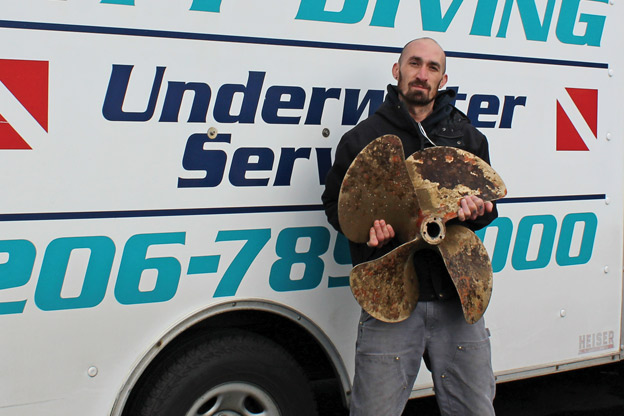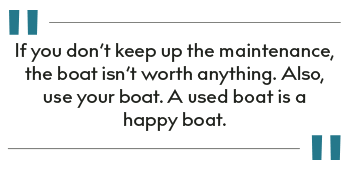“Perhaps I am the turtle, able to live simply
anywhere, even underwater for short periods,
with my home on my back”
-Kurt Vonnegut
Owners are no doubt well acquainted with their boats above the waterline, but an entire world exists under the surface. Many of a boat’s most important attributes, like the props, running gear, and hull’s integrity, sit just out of easy access for regular maintenance in the corrosive brine (unless moored in fresh water, of course). Those anodes need replacing, and just about every boat owner has a local diver who they rely on. But what makes a good diver, and what exactly do they do day in and day out?
It turns out that a good yacht maintenance diver, like many things in life, is only as good as his or her reputation. Many entrepreneurial charlatans exist who have enough dive gear to get hired, but don’t necessarily have any expertise with basic underwater maintenance or safety. Unfortunately, the boat owner’s prop could be eaten away by electrolysis from a poor anode installment as a result. A diver with a good reputation and plenty of experience will do a bona fide professional job.
I turned to Shane McCall, who has the coveted good reputation from the community and experience as the owner of Emerald City Diving servicing Puget Sound, Lake Washington, Lake Union, and Salmon Bay, for this month’s Ask the Experts to talk diving, underwater maintenance, and an aquatic lifestyle that most of us can only imagine. I caught up with McCall at Elliott Bay Marina in Seattle between jobs on a typical busy day. He was pushing a wheelbarrow up the ramp from E Dock and to his Emerald City Diving van in the parking lot that serves as a mobile base of operations
Q: Can you just say for the readers what’s in your wheel barrow right now?
I got two 28-inch propellers that we just pulled off a yacht that is going to get serviced, balanced, and tuned up at Kruger & Sons Propeller. They’ve got a lot of calcified growth on them and the blades are out of line when you track them.
Q: Are prop pulls a pretty typical job for you to do?
 We do a lot of prop pulling, but mostly we replace anodes. In Seattle, a typical boat should change out their sacrificial anodes every four to six months. It’s nonstop, even if he or she doesn’t use the boat very often, an owner needs to get the anodes checked. If you wait too long, propellers cost way more than your anodes do.
We do a lot of prop pulling, but mostly we replace anodes. In Seattle, a typical boat should change out their sacrificial anodes every four to six months. It’s nonstop, even if he or she doesn’t use the boat very often, an owner needs to get the anodes checked. If you wait too long, propellers cost way more than your anodes do.
Q: What’s the typical day in the life like? Do you get up at the crack of dawn?
We like to start early so we get off early. Basically, we come down to Elliott Bay Marina or Shilshole Bay Marina and we got a little work boat we work off of sometimes. We check in and usually work with a lot of anode maintenance and replacement with multiple clients. Sometimes we get something unusual, like salvage or dry dockings or recoveries. But usually we’re checking anodes or cleaning up running gear. We’ll change anodes as necessary. I like doing those and pulling propellers the best.
We clean racing sailboats when the season comes around, but I don’t like that work as much. We’ll get more calls in the summer for recoveries, often from people partying on their boats on the lake and they drop their keys or cell phones or wallets. We pick those jobs up a lot in the summer.
Q: Do you have any spectacular recovery stories?
I helped out one of my client’s big time. We found his wife’s custom platinum ring that fell off her hand after she washed her hands after washing the boat. Ever since we found the ring, he calls me his illegitimate son, because I’m part of the family now that I’ve saved his butt. We’ve been working together for eight years now.
Q: Washington is known for its strong environmental regulations. Are there any interesting curveballs policy-wise that effect what you do?
There are some rules against cleaning boats with ablative paints because the flakes come off and get into the water. We don’t do a lot of bottom cleaning anyway, so that doesn’t affect us too much. We also use aluminum anodes because traditional zinc anodes may be getting banned sometime in the future. Zinc anodes have cadmium in them, and that’s a pollutant for the fish, so we used aluminum anodes.
That’s about it, the regulations don’t really get in the way. We stay up with safety compliance, which involves safety meetings, having a standby diver on hand, and stuff like that. We’re required to be prepared for emergencies, know where the closest hospital is, and the like.
Q: Do you have any thoughts on bottom paints? You may have an interesting underwater perspective.
 Well, we get a lot of these new copper-free paints thanks to the state ban on copper. At first, they weren’t so good, but now they’re getting a lot better. Brand-wise, it’s hard to say, it depends on how you use your boat. If you use your boat a lot, it helps with the bottom paint and bottom growth. A lot of people try to have us scrub the bottom and they’re just wearing out the bottom paint before it’s time. Using your boat is way better for it.
Well, we get a lot of these new copper-free paints thanks to the state ban on copper. At first, they weren’t so good, but now they’re getting a lot better. Brand-wise, it’s hard to say, it depends on how you use your boat. If you use your boat a lot, it helps with the bottom paint and bottom growth. A lot of people try to have us scrub the bottom and they’re just wearing out the bottom paint before it’s time. Using your boat is way better for it.
Q: Is it territorial with diving companies?
Not really. Whatever somebody wants to do, they’re welcome to go for it. We rely solely on word of mouth because we’ve been here a long time, 20-something years now, and people know us. We don’t advertise or anything and let our reputation carry us. It’s free territory, but the hard part is breaking in and getting people to trust you to work on their expensive, million-dollar boats. Nobody wants some random guy off craigslist doing that kind of work. A lot of stuff can go wrong down there, and if you’re not doing it properly, you can cause a lot of damage; electrolysis to the prop, wreck the running gear, and stuff like that. We’ve seen some fly-by-night people come and not do anything once they get under and collect their paychecks.
Q: We’ve heard people vouch for you, so you must be doing something right!
Thanks, that’s really what it’s all about. Reputation for good work is what carries us.